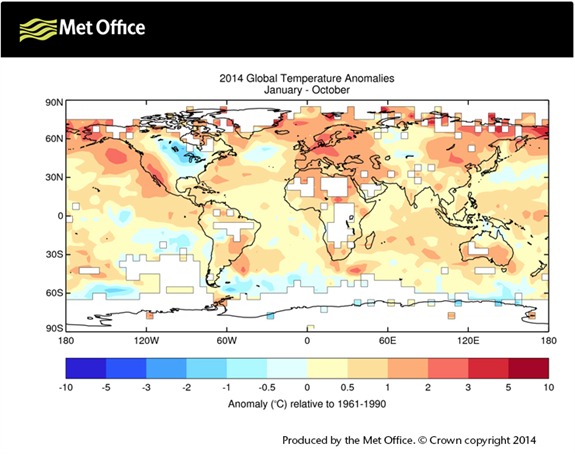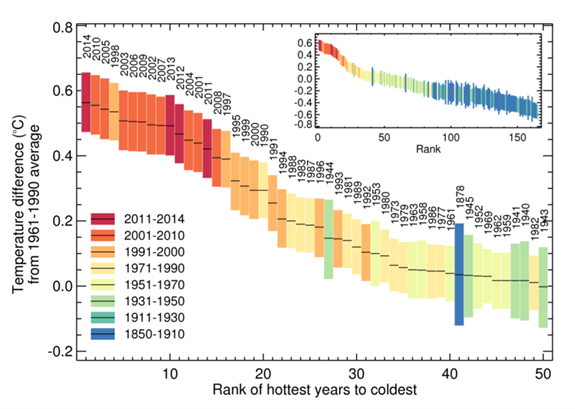
Met Office confirms 2014 among hottest years on record
Roz Pidcock
01.26.15Roz Pidcock
26.01.2015 | 11:20amThe UK Met Office has announced that 2014 was one of the warmest years since 1850.
Average air temperature over the land and sea surface was 0.56 degrees Celsius above the long-term average, tied with 2010 as the joint warmest year on record.
The Met Office is the fourth major meteorological organisation to release data confirming 2014 was a particularly warm year, despite not experiencing an El Niño.

Global temperature across the globe in 2014 (Jan – Oct), compared to the 1961-1990 average. Source: Provisional Met Office data, December 2014
A hot year
The average temperature across the globe in 2014 was 0.56 degrees Celsius above the 1961-90 long-term average, according to HadCRUT4 , a dataset jointly put together by the UK Met Office and the Climatic Research Unit (CRU) at the University of East Anglia.
This is very close to the 0.57 degrees Celsius the Met Office forecast for the year, which was issued in December 2013.
Lots of factors make measuring global temperature a difficult task, such as sparse data in remote places, random measurement errors and changes in instrumentation over time.
That means the uncertainty in temperature measurements can be larger than the difference between individual years, which typically comes down to just a few hundredths of a degree.
It’s for this reason, the Met Office can’t say for absolute certain which of many recent warm years was officially the hottest. Colin Morice explains:
“Uncertainties in the estimates of global temperature are larger than the differences between the warmest years. This limits what we can say about rankings of individual years. We can say with confidence that 2014 is one of ten warmest years in the series and that it adds to the set of near-record temperatures we have seen over the last two decades.”
Big picture
Prof Tim Osborn from CRU tells Carbon Brief that while it’s interesting whether or not individual years break records, the sequence of very warm years is more telling. He says:
“For climate change, it is the longer-term changes that matter most. It is clear that 2014 is part of a longer-term warming trend, mostly driven by emissions of greenhouse gases from human activity.”
The Met Office carries out attribution studies to assess how human influence has altered the chances of a particular event. It concluded that the global average temperatures seen in recent years would be highly unlikely in a world without human influence on the climate.
You can see the nominal ranking of hottest years in the chart below. For the most part, the hottest years on record have been in the past decade or so. [Updated]

El Niño no-show
It’s notable that 2014’s high temperatures occurred in the absence of an El Niño, a global weather event that tends to boost global temperature.
Despite strong initial signs last year, scientists have lowered the chances of an event in the next two months to 50 or 60 per cent. By contrast, the next warmest years on record, 2010 and 2005, both saw strong El Niño events.
Prof Phil Jones, of the University of East Anglia, said in today’s press release:
“2014 was an exceptionally warm year which saw warm tropical pacific temperatures, despite not being officially regarded as an El Niño.”
NASA, NOAA and the JMA
The Met Office is one of four major meteorological organisations monitoring global temperature. Last week, NASA and NOAA jointly announced that 2014 was most likely the hottest year on record, though the difference between the top three years is very small.
The Japan Meteorological Agency came to the same conclusion earlier this month. Each of the four major records tell a consistent story, Osborn tells us:
“Four other groups have analysed the Earth’s surface temperature and their results agree with our finding; the small differences in values and ranking are expected because of the small uncertainty in each group’s results.”
The World Meteorological Organisation ( WMO) is expected to issue a statement later this week combining output from NASA, NOAA and HadCRUT4.
For more on the four different datasets and what goes into taking earth’s temperature, read our background briefing here.
Main image: Local people take bath from municipal water source to keep them self cool from heat wave on June 10, 2015 in Calcutta, India.
Update 27th Jan 2015 - this article has been updated to include the most recent version of the annual global temperature rankings chart from the Met Office.

